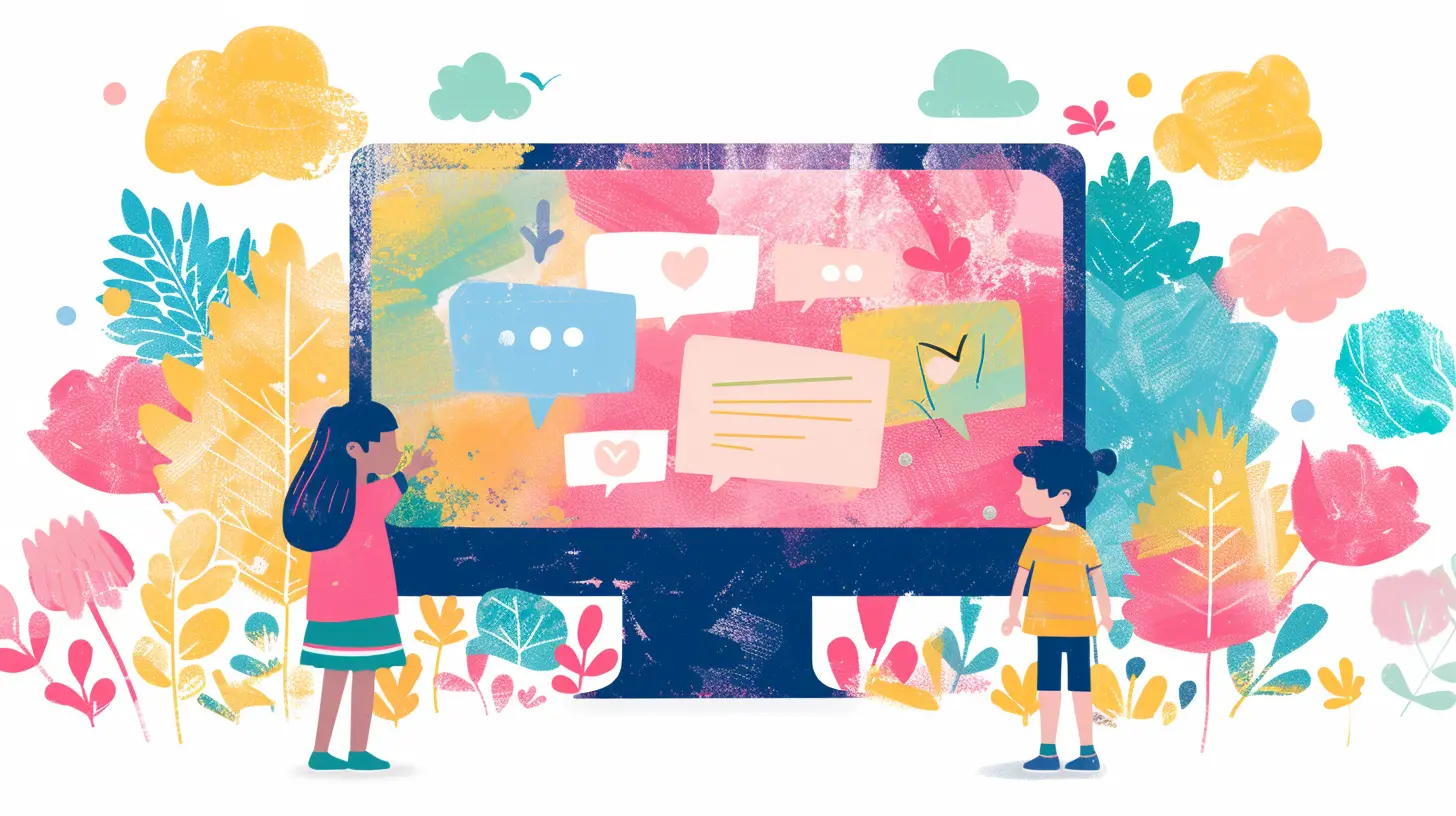How to Discuss Online Bullying with Your Child
15 July 2025
Let’s face it—kids today live in a digital world. Social media, online games, and messaging apps are basically their second home. And while technology connects them with friends, it also opens the door to some real dangers—one of the biggest being online bullying, or cyberbullying.
If you're a parent, this topic might feel like walking on eggshells. How do you talk about something so serious without sounding preachy? How do you even bring it up without embarrassing your child? Don’t worry—we’re going to walk through it together.
This guide is your go-to resource to help you sit down and have a meaningful, non-cringe-worthy conversation with your child about online bullying. So, grab a cup of coffee, take a deep breath, and let's dive in.
What Is Online Bullying, Really?
First things first: let’s make sure we’re on the same page.Online bullying (sometimes called cyberbullying) is when someone uses digital platforms to harass, threaten, or humiliate another person. It can look like:
- Mean texts or comments
- Spreading rumors online
- Sharing embarrassing photos or videos
- Excluding someone from a group chat on purpose
- Impersonating someone or hacking accounts
It’s not just "kids being kids." It can have real emotional consequences, including anxiety, depression, and in some tragic cases, even suicide.
So yes, it’s a big deal. And yes, your child could be affected—either as the target, the bystander, or even the perpetrator.
Why It’s Important to Talk About It
Let’s be honest—your child may not bring this up to you on their own. Why?- They might fear losing phone or internet privileges.
- They don’t want to seem weak or like a tattletale.
- They may not even realize what’s happening is bullying.
That’s why it’s crucial for us, as parents, to open that door and let them know it’s okay to talk. By discussing online bullying, we empower our kids to stand up for themselves and others—online and off.
Signs Your Child Might Be Experiencing Online Bullying
Before jumping into the conversation, it helps to know what to look for. Kids won’t always come out and say, “Hey Mom, I’m being bullied online.” But actions often speak louder than words.Watch for these red flags:
- Suddenly avoiding devices or social media
- Becoming anxious, moody, or withdrawn
- Trouble sleeping or unexplained headaches
- Grades dropping or refusing to go to school
- Hiding their phone or computer screen
- Deleting accounts or creating new ones frequently
Any of this sound familiar? Then it might be time for a heart-to-heart.
How to Prepare for the Talk
Okay, so you’ve noticed something’s off, or maybe you just want to keep the communication lines open. Here’s how to prepare:1. Choose the Right Time
Timing matters. Bring it up when your child is relaxed—not when they're in the middle of homework or arguing with their siblings. Maybe during a car ride or while cooking together. A casual setting can make tough topics easier to digest.2. Get Educated
Before diving in, make sure you understand the basics of the platforms your child uses. Know the lingo. Familiarize yourself with trending apps. You don’t need to become a TikTok influencer, but knowing what goes on helps you talk their language.3. Keep Emotions in Check
This is a big one. If they do open up, resist the urge to freak out. Stay calm. Your child needs to know you’re a safe, supportive place—not someone who’s going to go nuclear and ban all screen time.How to Start the Conversation
Don’t overthink it. You’re not writing a speech here. Just keep it real and relatable.You could say:
- “I read something about online bullying today, and it got me thinking. Have you ever seen someone getting picked on online?”
- “Social media is such a huge part of life now. Do you feel like people are kind to each other on the apps you use?”
- “You know, if something online ever made you uncomfortable, you could always tell me, right?”
The goal isn’t to interrogate—it’s to connect. Ask open-ended questions. Then really listen.
What to Say If They Admit to Being Bullied
If they open up, bravo. That took guts. Here’s how to handle it:1. Validate Their Feelings
Say things like, “That sounds really hard,” or “I’m so sorry that happened.” Don’t downplay it or say “Just ignore it.” That won’t help.2. Reassure Them
Let them know they’re not alone—and that you’re proud of them for speaking up. Remind them: being bullied says nothing about their worth.3. Make a Plan Together
Ask your child what they’d like to do about it. Some options:- Blocking the bully
- Reporting the incident to the platform
- Saving evidence (screenshots, messages)
- Talking to a school counselor or trusted adult
The most important part? Let them help drive the plan. Give them agency.
What If Your Child Is the Bully?
Oof. Hard pill to swallow, but we’ve got to go there.If you find out your child has been bullying others online, don’t panic—but don’t ignore it either.
- Start by staying calm. Find out what happened and why.
- Emphasize that words matter—even online.
- Talk about empathy. Ask how they’d feel if the roles were reversed.
- Set clear consequences, and follow through.
- Encourage them to apologize if appropriate.
This isn’t about shame—it’s about accountability. Help them learn and grow from it.
How to Keep the Conversation Going
One talk won’t cut it. Online bullying isn’t a one-time event—it’s an ongoing risk. So, keep checking in.Make it a regular part of your digital parenting routine:
- “Seen anything weird online lately?”
- “Anyone at school dealing with drama online?”
- “How’s that group chat going? Still feeling good about it?”
Normalize these chats so they don’t feel like a big scary deal. Think of it like brushing teeth—just part of the daily routine.
Teaching Your Child to Be a Responsible Digital Citizen
Sure, you can’t control everything your kid sees or does online. But you can teach them how to navigate the digital world with kindness and confidence.Here’s what to instill:
1. Think Before You Post
Remind them: if you wouldn’t say it face-to-face, don’t say it online.2. Respect Privacy
Teach them to avoid sharing other people’s pictures, secrets, or personal info without permission.3. Handle Conflict Offline
Encourage them to work out problems in person, not through posts or group chats.4. Stand Up For Others
Being a bystander who speaks up can change everything. Maybe even save a life.Set Boundaries and Monitor (Without Spying)
Let’s be real—kids need some privacy. But they also need boundaries. Think of it like giving them a driver’s license. You don’t hand them the keys to a Ferrari without a few rules first.- Set screen time limits
- Know which apps they’re using
- Have access to passwords (especially for younger kids)
- Keep devices out of bedrooms at night
But also? Let them know you trust them—and that they can come to you no matter what.
Encourage a Support System
Your child doesn’t need to face online bullying alone. Encourage strong friendships. Let them know who else they can talk to—a school counselor, teacher, coach, or trusted family member.Having a solid support system can make all the difference.
When to Get Professional Help
If your child’s mood is really taking a hit—if they’re becoming depressed, anxious, or withdrawn—it might be time to get professional help. There’s no shame in talking to a therapist. Think of it as mental health maintenance, just like going to the doctor for a check-up.Final Thoughts
Talking to your child about online bullying isn’t a one-and-done chat. It’s an ongoing conversation built on trust, respect, and a whole lot of love.Will it be awkward at first? Maybe. But you’ve got this. The most important thing is showing up and letting your child know: “I’m here for you—no matter what.”
In a world that can sometimes feel pretty harsh, just knowing there’s someone in their corner makes all the difference.
all images in this post were generated using AI tools
Category:
Dealing With BullyingAuthor:

Zelda Gill
Discussion
rate this article
1 comments
Abram McPhee
It's essential to approach the topic of online bullying openly and honestly. Encourage your child to share their experiences without fear of judgment. Reinforce that they aren't alone and that it's okay to seek help. Empower them to stand up and speak out.
July 23, 2025 at 2:19 AM

Zelda Gill
Absolutely! Open communication is key. By fostering a judgment-free environment, we can help children feel safe sharing their experiences and empower them to seek support.


